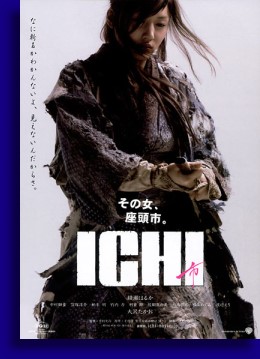

Reviewed by
Christopher Armstead

The legend of the blind swordsman Zatoichi takes a turn for the fairer… considerably… as the stunning young actress Haruka Ayase picks up the blade and wanders the Japanese countryside searching for her father in director Fumihiko Sori’s lyrical tale ‘Ichi’.
We first meet Ichi stumbling through some snowy windswept hills, desperate for a place to stay, while on a yet to be determined personal quest. Eventually someone takes pity on the young woman but it’s not long before someone attempts to take advantage of this inanely attractive blind woman. As a side note it would appear that rape is the order of the day in Japan during this time… the jaded amongst us might say that it’s the order of the day at any time in the history of Japan, though that would not me saying that. Anyway, as this man would quickly discover, this woman is not the one to mess with.
However don’t think that this young woman, a master of the backhand sword technique, is a defender of the weak. No sir, she is simply a defender of herself. For instance a blind prostitute showed Ichi some kindness in allowing her to stay at her Goze house, but when a client of this woman refused to pay her for services rendered, and then proceeds to pummel the poor woman, with the assistance of his crew no less, with her crime being having the nerve to request payment, Ichi did not come to this woman’s aid because the quarrel did not concern her. Obviously a person who steals from a blind whore and the beats a blind whore is not a very good person, and it’s not long before this cat and his two colleagues turn their attention to the quiet blind woman, sitting off to the side minding her own business, playing with her little bell. Fortunately for Ichi, somewhat, a wandering stranger named Fujihara (Takao Osawa) shows up to save her from these ruffians… more or less.
Fujihara, feeling somewhat responsible for Ichi for whatever reason, joins her on her quest which leads them to this small Inn town where they find more trouble that Ichi’s


blade bails them out of, which in turn leads to Fujihara being mistaken for someone he is not. The pair settles into this town for a bit, Ichi becoming closer to finding what she is searching for but alas more trouble, not surprisingly, is on its way. This trouble would be in the form of the leader of a brutal gang who is terrorizing this town, with Fujihara being hired by the young leader of this town to protect them against this terrorization, a task for which he is ill equipped to perform. As it so happens the leader of this gang also possesses intimate knowledge of what our sad and solemn sword carrying mistress is searching for. Demons are the order of the day for both Ichi and Fujihara, demons that have left both of their hearts empty and demons which they must somehow overcome, only through each other, if either of them is going to survive.
The last blind swordsman movie I saw was Takeshi Kitano’s ‘Zatoicihi’ which was a fun, action filled, off beat tale and pretty much was typical Kitano. This wasn’t that. Fumihiko Sori’s film takes a completely different slant on the legend of the blind swordsman that extends beyond simply changing the characters gender. Sori presents a tale that is more lyrical than expected, more in line with the tragic Japanese dramas of early Japanese cinema and a film that is probably best categorized as a Romance / Adventure more so than an Action / Adventure. There are fight sequences and plenty of CGI blood spurting all over the place during these fight scenes, but the sword play isn’t the central focus of the film. Instead we focus on the empty damaged heart of Ichi which was brought to life in a fully realized performance by Haruka Ayase who shows with this performance she can do much more than simply be pretty, though she does that well too. Equal weight was also given to Takao Osawa’s downtrodden samurai, at first played for seemingly comic effect but Osawa was able to bring much more the character through the course of the movie paralleling what Ayase was able to bring to the character of Ichi.
In addition to being well acted, one the elements that really stands out about this film is how beautifully it is shot. Sori, working with cinematographer Keiji Hashimoto, have created a film that is so vivid with its colors, so crisp in its presentation and so lovely to look at that it’s almost worth watching just to witness the artistry behind the technical wizardry that was used in bringing this story to life.
It wasn’t all lilacs and roses with this film because for one, Nakamura Shido’s character as our main heavy was over the top to the point of distraction, and the narrative outside of the characters of Ichi and Fujihara didn’t have a heckuva lot of substance to support these two superlative characters. Without this support the movie did tend to drag in spots, particularly when the focus went away from the two main characters in the film.
Nonetheless Sori’s ‘Ichi’ is a beautiful film that tells a classic tale in a completely different but satisfactory way. With the majority of this satisfaction riding on the strong shoulders of leads Haruka Ayase and Takao Osawa. This almost erases Osawa showing up as the bad guy in the Steven Seagal flick ‘Into the Sun’. Almost.

